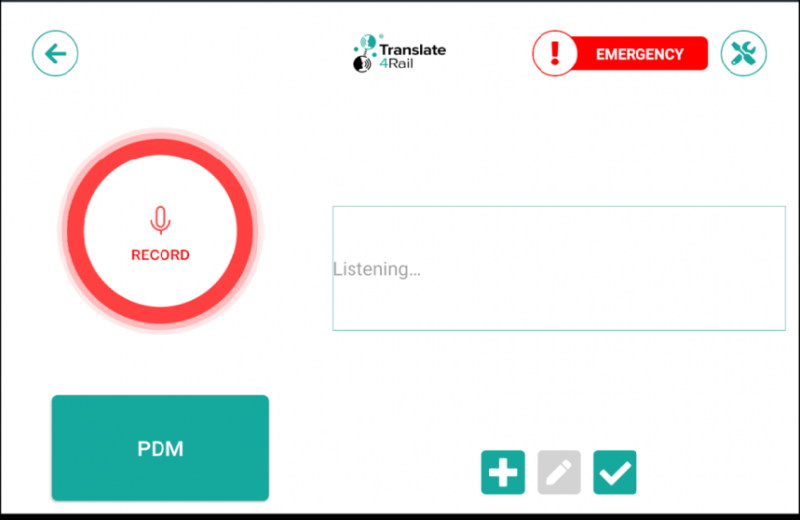Translate4Rail Project
The ambition of the RailFreightForward coalition is to increase the modal share of rail freight in Europe from the current 18% to 30% by 2030. Before reaching this, decisive action from railway undertakings (RUs) and infrastructure managers (IMs) is needed. Eventually, driving a train through Europe should become as easy as driving a truck.
One of the obstacles to overcome in order to achieve this ambitious RFF target is the existing language barrier. The “Translate4Rail” (T4R) project and its T4R language tool (LT) aims at improving interoperability within a European Drive through philosophy. Competitiveness will be enhanced and cross-border operations will be simplified.
The concept of the T4R project is to offer drivers a fully comprehensive set of predefined standardised messages and an LT which encompass all they have to exchange with an IM traffic controller in normal or exceptional operational situations in a country where they neither understand nor speak the local language. The Shift2Rail funded project is a two-year project, coordinated by the UIC Freight Department as a joint UIC and RailNetEurope (RNE) project.
A significant milestone was reached, when the development and testing phase regarding the prototype, in close collaboration with the French app development company Synvance, was successfully achieved. The LT enables drivers and traffic controllers from different countries to communicate safely and effectively with each other across language barriers. This capitalises on the work already committed on this matter between RUs and IMs at UIC and RNE on the level of the X Border project and sector Language Programme This work involved analysing the various types of operational situations that require exchanges between RUs drivers and IM traffic controllers. The project will make it possible to test this work and to further harmonise and standardise pre-defined messages in the light of the test results.
The LT will be operationally tested on pilot trains running on cross-border sections between Italy and Austria on the Tarvisio-Villach-Pontebba cross-border section. The pilot tests are run by Rete Ferroviaria Italiana (RFI) and ÖBB-Infrastruktur AG (ÖBB Infra) together with the RUs Mercitalia, DB Cargo and ÖBB RCG. Testing under laboratory conditions started in autumn 2020. Tests under field conditions will be performed from spring 2021 onwards and are expected to run until the end of September 2021.
By all means, the current safety level will be maintained. Other benefits like increased traffic flow and overall rail competitiveness will bring the true added value.
Why are the Rail Freight Forward coalition and UIC working on this topic?
Ask any train driver and he or she will be able to give you plenty of examples of cross-border or interoperability issues. Despite 50 years of European integration, driving a train through Europe is far from easy once you need to cross borders. Many operational constraints still exist. One of those issues is the language barrier because regulatory constraints require each driver to know the language(s) of the country (s)he is operating in. This situation has a negative impact on the productivity and the attractiveness of rail as a transport mode. It leads to inefficiencies, lack of transparency and operational complexity, resulting in costly services. This project aims to wipe off this language barrier and enable any driver to continue driving his/her train safely in a country where he does not speak the national language.
How does the T4R project contribute to the coalition’s ambitions?
A major priority of the RFF coalition is to proactively drive the modal shift forward and propose quick wins to implement a ”drive-through” philosophy. Under the umbrella of the S2R-funded T4R project, the sector has achieved a breakthrough in using digitalisation help address driver language issues.
By addressing the issue of maintaining safety levels on Trans-European trains running across Europe, the fluidity at border crossings resulting in more optimal use of existing capacity and finally, competitiveness increases with fewer constraints on drivers. T4R is a massive contribution to achieving RFF’s 30% by 2030 target.
Why is RFF important for T4R project?
The coalition unites freight RUs across Europe. As the T4R project can only be successful if supported by a vast majority of the players, the coalition is the ideal incubator to foster this success. In the first T4R pilots governed by RFI and ÖBB Infra in which the LT is currently being tested involve the RUs Mercitalia, DB Cargo and ÖBB RCG, who are all members of the RFF initiative.
Why is T4R important for Europe and the “European Year of Rail”?
The EU Green Deal aims to make Europe the first climate-neutral continent by 2050. The “European Year of Rail” highlights the strong assets railways possess in their ability to contribute to this ambition. Rail freight and its ambitions to increase its modal share to 30% by 2030 should become the backbone of Europe’s future freight mobility strategy. This will require a significant modal shift. A shift, which will only happen if rail is competitive, flexible and agile in relation to its customers’ demands. In such a world, interoperability issues like language barriers are out of the question. The T4R project encompasses the ambitions of RFF and contributes to overcoming the language barrier. For now, everything seems to indicate that with T4R, sector cooperation will make it possible to eliminate the language barrier in order to boost the modal shift to rail.
More about the project: https://translate4rail.eu/
For further information please contact:
UIC: Sandra Géhénot, UIC Freight Director
gehenot [at] uic.org
Constanze Bannholzer, Senior Freight Advisor
bannholzer [at] uic.org
RNE: Peter Šišolák, Head of TM and TPM
peter.sisolak [at] rne.eu
Juraj Maliaček, Traffic Management Manager
juraj.maliacek [at] rne.eu

This project has received funding from the Shift2Rail Joint Undertaking (JU) under grant agreement No 881779. The JU receives support from the European Union’s Horizon 2020 research and innovation programme and the Shift2Rail JU members other than the Union.

